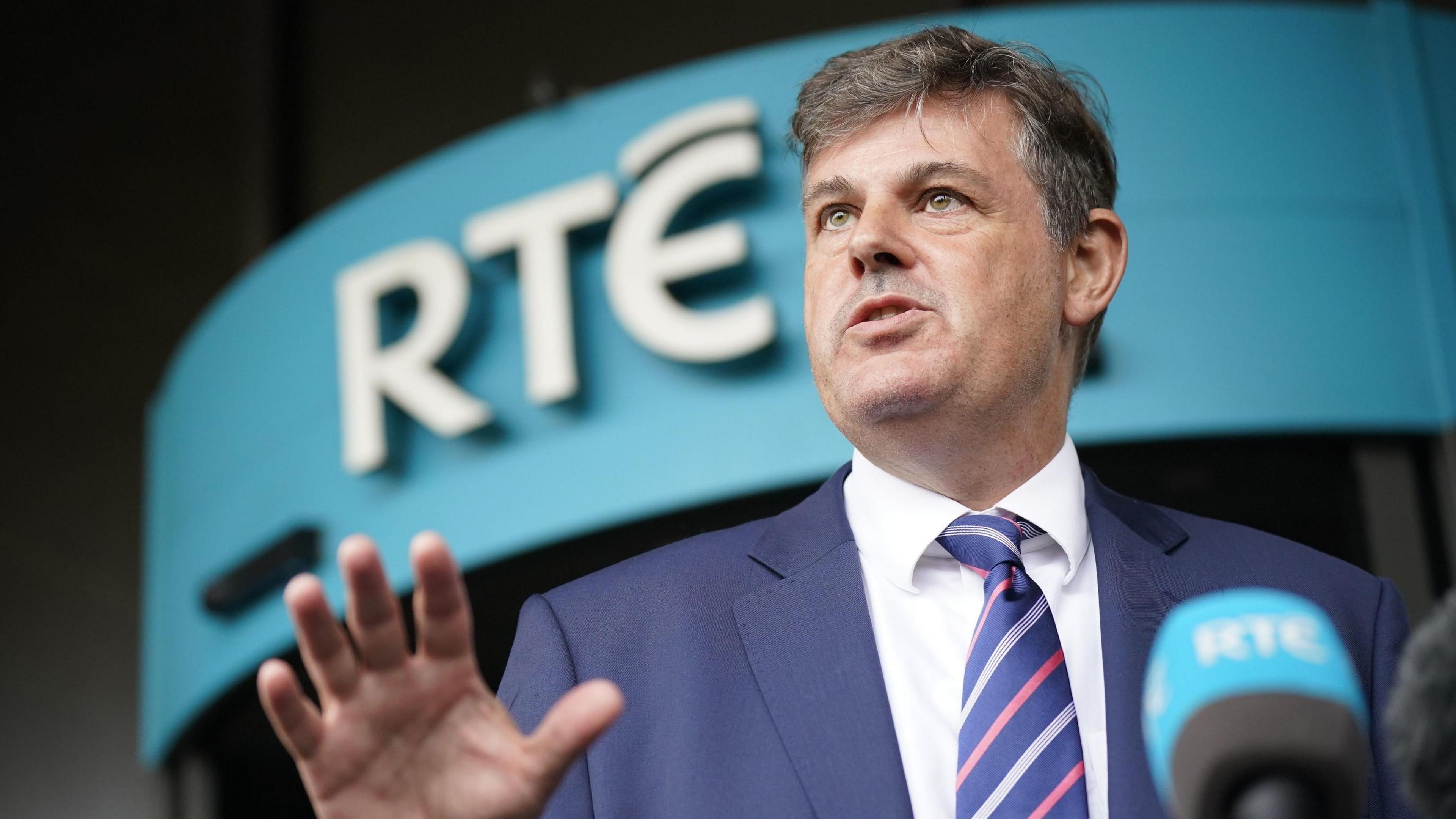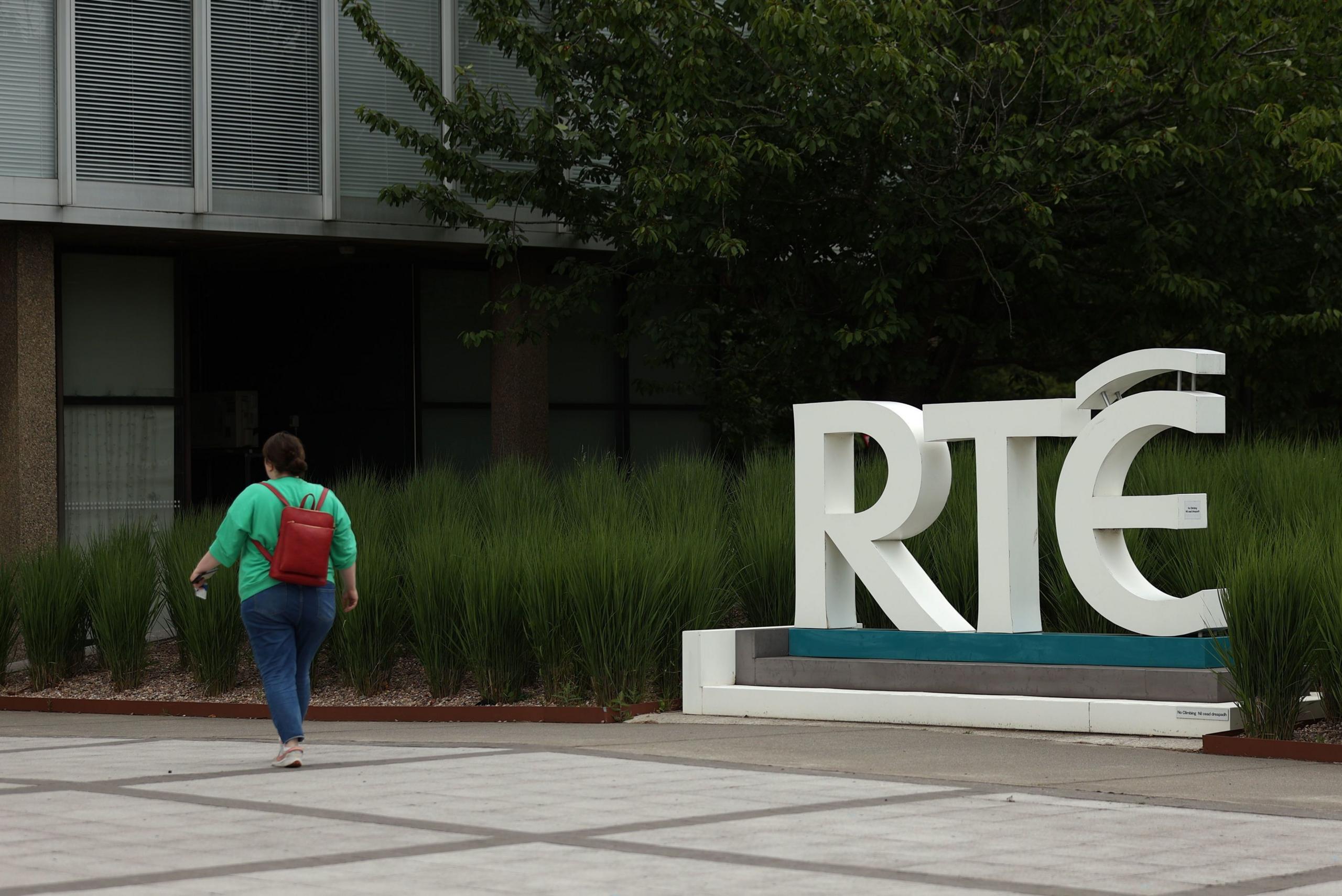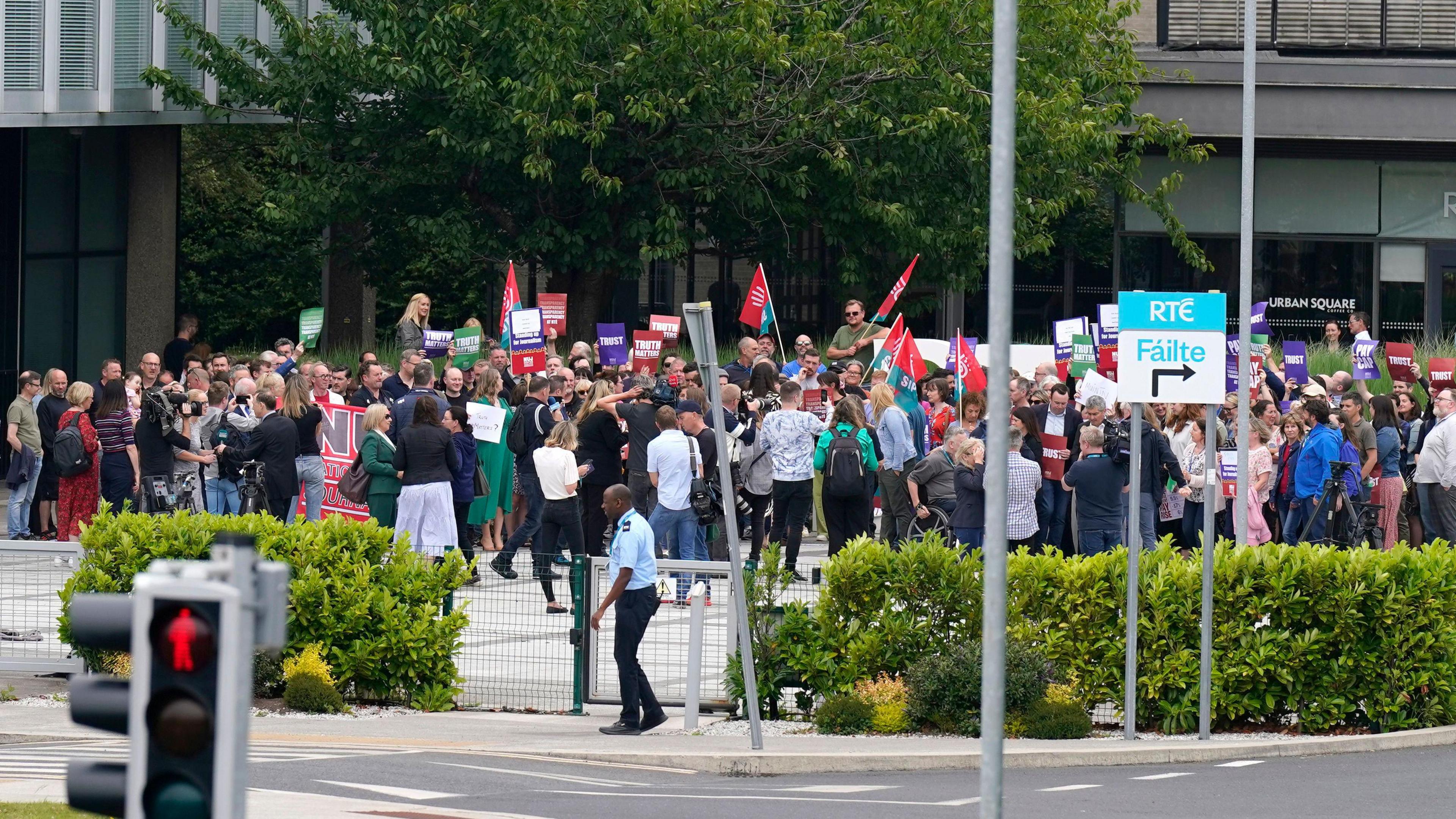Salary cap to be set for staff at broadcaster RTÉ

RTÉ director general Kevin Bakhurst
At a glance
No one at the Republic of Ireland's national broadcaster - RTÉ - will be paid a salary exceeding that of the organisation's director-general
Staffing at the organisation is to be reduced by around 400 people, according to a just-released plan
RTÉ intends to produce "significantly more content" outside of Dublin as part of a wider cost-cutting strategy
The Irish government has approved funding of €56m (£49m) for RTÉ
- Published
No one at RTÉ will be paid a salary exceeding that of the director-general's, with a staff pay cap also introduced under plans to reorganise the Irish broadcaster.
Details of a new "strategic direction and vision" have been revealed in a report published on Tuesday.
It was announced by director general Kevin Bakhurst, who also said the broadcaster will continue to reduce the pay of its highest paid presenters.
Under the plan, staffing at RTÉ will be cut by 20 per cent - or around 400 people - by 2028.
This will create "a more streamlined, modern, simplified organisation," according to the New Direction report., external
Fewer employee numbers will be partly achieved by a voluntary redundancy scheme which "will aim to particularly reduce the number of staff paid over €100,000 (£87,000)," the report said.
Other cost-saving measures include a review of staff allowances and expenses, targeted recruitment and technological investments.
Smaller headcount and footprint
The document also proposes "rebalancing" production nationwide with "significantly more content" created outside of Dublin - this, the report said, will see "a smaller RTÉ in both headcount and footprint".
The broadcaster intends to invest in an expanded production centre in Cork, as well as promising a "renewed commitment" to Limerick and Galway.
Meanwhile, the amount of RTÉ content commissioned from the independent sector looks set to increase.
"We will begin scaling up video and audio commissions, increasing our spend by 50% by 2028," the report added.

The broadcaster intends to operate "on a smaller footprint within the Donnybrook site"
Details of an expected announcement about job cuts had leaked to Irish media outlets on Monday.
Earlier on Tuesday, the Irish government confirmed that it had approved funding of €56m (£49m) for the broadcaster.
This includes €16m in interim funding, along with €40m in 2024, for the broadcaster.
The interim funding package of €56 million is subject to conditions, Taoiseach (Irish Prime Minister) Leo Varadkar, said.
'A shock for employees'
A forecast by the government has predicted a drop in licence fee income will cost RTÉ €21m in revenue for 2022 and €40m in 2023 if it continues.
RTÉ had sought €34.5m in funding in the most recent government budget.
Earlier on Tuesday, the taoiseach said he understood the level of redundancies would be a shock for RTÉ employees.
But he said the plan was not proposed by government - adding that RTÉ was autonomous in its decisions.
He also said he understood any redundancies would be phased and not compulsory.

In June RTÉ staff protested outside their HQ over the financial scandal
RTÉ has seen its income from licence fees plummet follow a high-profile financial scandal involving one of its highest-paid presenters.
In June, it emerged that former Late, Late Show presenter Ryan Tubridy had received thousands of euros in undisclosed payments from RTÉ.
Mr Tubridy was paid €345,000 more than his publicly declared salary over a five-year period from 2017 to 2022.
The scandal came to light after auditors raised concerns about RTÉ's accounting methods.
Some of the undisclosed payments were made through barter accounts - a system where goods and services are exchanged for other services such as advertising slots.
A further examination of RTÉ's finances revealed it operated three barter accounts which showed some unusual transactions.
Items charged to the barter accounts included €12,000 for Bruce Springsteen concert tickets and almost €5,000 for 200 pairs of flipflops for a summer party.
Slush fund claim
When details were examined by an Oireachtas (Irish parliament) committee, Fine Gael TD (MP) Brendan Griffin accused RTÉ of operating a "slush fund".
When called before parliament to explain, the chair of RTÉ'S board Siún Ní Raghallaigh said it was the "undoubtedly the darkest period in RTÉ's history".
The spending culture within the organisation angered licence fee payers, many of whom were struggling to pay domestic bills during the cost of living crisis.
There was a sharp fall in licence fee receipts and by last month it was reported that licence fee payments were down €21m (£18.1m) since the scandal began
Mr Bakhurst told a hearing of the Oireachtas Public Affairs Committee that RTÉ would be insolvent by next spring if it does not receive proper funding.
Earlier on Tuesday, the secretary of the RTÉ Trade Union Group, Cearbhall Ó Síocháin said the broadcaster was already experiencing staff shortages.
He said that a reduction of 20% would be "a huge chunk of the workforce" and added redundancies would increase the workload of remaining employees.
"The implications here is that staff are picking up the tab for poor governance and bad management by those who've walked away on big money."
Related topics
- Published11 July 2023

- Published5 July 2023
- Published26 June 2023

- Published22 June 2023
